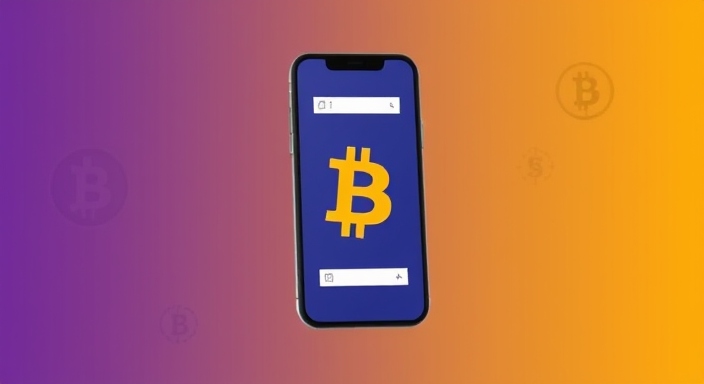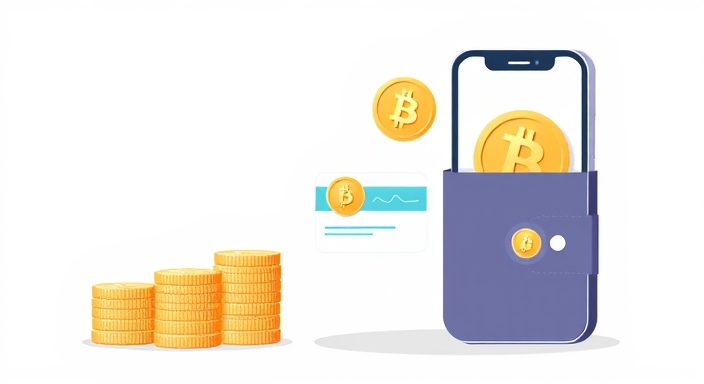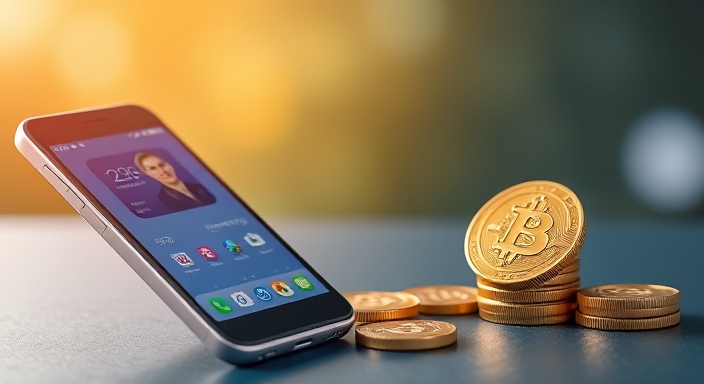In today’s rapidly evolving digital landscape, the way businesses engage with customers is transforming. From e-commerce platforms to in-store purchases, technology plays a crucial role in shaping consumer behavior and expectations. One of the most significant changes in recent years has been the rise of mobile wallets and cryptocurrency payments, which are gradually becoming essential payment options for businesses across industries.
Looking ahead to 2025, it’s clear that businesses that fail to embrace mobile wallet and crypto payment solutions will be at a competitive disadvantage. This post will explore the reasons why your business needs to incorporate mobile wallet and cryptocurrency payment options into its payment ecosystem and the numerous benefits that come with them.
Table of Contents
What is a Mobile Wallet?

A mobile wallet is a digital tool that allows users to store payment information, loyalty cards, and other types of personal data on their smartphones. Mobile wallets eliminate the need to carry physical cards, cash, or coins and enable users to make payments with a tap or scan of their mobile device at participating retailers. They offer convenience, security, and the ability to make transactions without physical interaction.
Some of the most popular mobile wallets include Apple Pay, Google Pay, Samsung Pay, and PayPal. These platforms typically use Near Field Communication (NFC) technology to transmit payment information securely.
Key Features of Mobile Wallets:
- Storage for multiple payment methods: Credit cards, debit cards, and sometimes even cryptocurrencies.
- Secure transactions: Encryption and tokenization of payment information.
- Convenient and quick transactions: One-tap payments and integration with smartphones.
- Integration with other services: Loyalty programs, tickets, and even digital identification.
What is Cryptocurrency Payment?

Cryptocurrency payment refers to the use of digital currencies like Bitcoin, Ethereum, or stablecoins to facilitate transactions. Unlike traditional currencies that rely on central banks and financial institutions, cryptocurrencies operate on a decentralized network using blockchain technology.
Blockchain ensures the security, transparency, and immutability of transactions, making cryptocurrency payments a unique and trusted way to transfer value globally.
How Cryptocurrency Payments Work:
- Decentralized ledger: Transactions are recorded on a public, decentralized blockchain, reducing the risk of fraud or manipulation.
- Digital wallets: Users store their cryptocurrencies in digital wallets, which allow them to send or receive funds across borders quickly and securely.
- Low transaction fees: Unlike traditional banking systems, cryptocurrency payments often have lower processing fees, especially for cross-border transactions.
The Growing Importance of Digital Payments
A Global Trend: The Shift Toward Digital Payments
The global shift towards digital payments is not a passing trend. According to reports from the World Bank, over 70% of global adults now have access to a bank account, but the use of traditional banking methods for payments is gradually decreasing. Digital wallets and cryptocurrency transactions have risen in popularity due to their convenience, security, and integration with mobile technology.
Smartphones have become an integral part of everyday life, and consumers are increasingly relying on their devices to make transactions. Mobile wallets such as Apple Pay, Google Pay, and Samsung Pay enable users to store their credit and debit cards, loyalty programs, and even cryptocurrencies in one convenient place. Similarly, the rise of cryptocurrencies like Bitcoin, Ethereum, and newer stablecoins has added an additional layer of financial freedom and flexibility.
The Growth of Mobile Wallet Usage
According to a report by Statista, the global number of mobile wallet users was expected to surpass 5.1 billion by 2025, with the global mobile wallet transaction value reaching over $13 trillion. This demonstrates the increasing reliance on mobile wallets by consumers worldwide. For businesses, offering mobile wallet payment options ensures that they meet the growing demand for cashless transactions.
Why Your Business Needs Mobile Wallet and Crypto Payment Options

The Convenience Factor
Seamless Customer Experience
The primary advantage of mobile wallets and crypto payment options is the convenience they offer both customers and businesses. Mobile wallets allow customers to make payments with just a tap or a scan, eliminating the need for physical cards, cash, or even typing in long card details. This frictionless experience encourages faster transactions and can improve the overall customer experience.
For example, mobile wallets store multiple payment methods, which means customers don’t need to carry their physical credit cards, debit cards, or cash. They can simply use their smartphone to make payments anywhere, from retail stores to online shopping sites.
Similarly, cryptocurrencies provide a similar level of convenience, enabling users to send payments across borders in real-time without relying on banks or third-party payment processors. This global reach ensures that businesses can easily cater to international customers without worrying about exchange rates or transaction fees.
Contactless Transactions
The COVID-19 pandemic accelerated the adoption of contactless payment methods, and mobile wallets and cryptocurrencies fit perfectly into this trend. Consumers increasingly prefer to avoid physical contact when making payments, and mobile wallets offer a safe, hygienic alternative to cash and card-based transactions. The use of NFC (Near-Field Communication) technology in mobile wallets ensures that payments can be completed by simply tapping a smartphone on a payment terminal.
Cryptocurrency transactions are also inherently contactless and don’t require physical interaction with any point-of-sale hardware. This trend toward contactless payments will continue to grow, especially as hygiene-conscious consumers remain wary of handling physical payment methods.
Security and Fraud Prevention
Enhanced Security with Encryption and Biometric Authentication
One of the primary concerns for both businesses and consumers when it comes to digital payments is security. Mobile wallets and cryptocurrencies address these concerns with advanced security features, ensuring that both businesses and customers are protected from fraud.
Mobile wallets use a combination of encryption, tokenization, and biometric authentication (such as fingerprints or face recognition) to secure transactions. The tokenization process replaces sensitive credit card information with unique tokens, reducing the risk of data breaches and fraud. Additionally, the biometric features in mobile wallets make it more difficult for unauthorized users to access payment methods.
Cryptocurrency transactions are also highly secure due to blockchain technology. Each transaction is recorded on a decentralized ledger, making it nearly impossible for hackers to alter or manipulate transaction data. Furthermore, the use of private and public keys in cryptocurrency wallets adds another layer of security, ensuring that only the rightful owner can authorize transactions.
Lower Fraud Risks
With traditional payment methods, businesses are often exposed to risks like chargebacks, fraud, and identity theft. Mobile wallets and cryptocurrencies reduce these risks by offering more secure payment methods. Mobile wallets store encrypted payment information, which minimizes the chances of data being stolen or misused. Cryptocurrency transactions are irreversible, which means they eliminate chargeback fraud and reduce the risk of fraudulent claims.
In the long run, offering secure payment methods will help build customer trust, which can lead to improved customer retention and loyalty.
Expanding Market Reach
Attracting a Tech-Savvy Consumer Base
As more people become familiar with mobile wallets and cryptocurrency, businesses that fail to offer these payment methods risk alienating a growing segment of tech-savvy consumers. Younger generations, in particular, are more inclined to use digital payment methods over traditional ones. According to a 2023 report from Deloitte, 56% of Gen Z consumers in the U.S. prefer using mobile wallets for payments.
Incorporating mobile wallets and crypto payment options into your business’s payment infrastructure will help attract this tech-savvy demographic and ensure your business remains relevant to evolving customer preferences.
Expanding International Business Opportunities
Cryptocurrencies, in particular, open up opportunities for businesses to expand internationally. Traditional payment systems often have high fees for cross-border transactions and may involve lengthy delays due to time zone differences and bank processing times. With cryptocurrency payments, transactions can occur instantly and at a much lower cost, providing a smoother and more affordable way to do business globally.
Mobile wallets also facilitate international payments, enabling users to store multiple currencies, both fiat and digital, and make purchases from anywhere in the world. By embracing these technologies, your business can expand its market reach and cater to international customers without worrying about the complexities of foreign exchange and traditional banking fees.
Cost Reduction and Efficiency
Reduced Transaction Fees
Mobile wallet payments are typically cheaper than traditional payment methods, especially credit card transactions. Credit card companies and banks charge businesses processing fees, which can be as high as 3% per transaction. Mobile wallets, on the other hand, often have lower fees or none at all, depending on the platform. This reduction in transaction fees can significantly lower operating costs, especially for small and medium-sized businesses.
Cryptocurrency payments can also reduce transaction fees compared to traditional payment processors, which often charge a percentage of the sale amount. Blockchain networks like Bitcoin and Ethereum typically have lower fees for cross-border payments, making them an attractive option for businesses that engage in international transactions.
Faster Transactions
Mobile wallets and cryptocurrencies offer faster transaction processing times. While credit card transactions can take several days to settle, mobile wallet payments are processed in real-time. This can improve cash flow for businesses by reducing the time it takes for payments to be received and processed.
Cryptocurrency transactions are also processed almost instantaneously, regardless of the location of the sender or recipient. The use of blockchain technology eliminates the need for intermediaries like banks, which can delay or complicate transactions.
Future-Proofing Your Business
Staying Ahead of Technological Advancements
The payments landscape is constantly evolving, and the technologies driving mobile wallets and cryptocurrencies will continue to improve over the next several years. By adopting these technologies early, businesses can position themselves as industry leaders and stay ahead of the curve.
Blockchain technology, for example, is expected to continue evolving, leading to faster, cheaper, and more secure cryptocurrency transactions. Additionally, as the adoption of digital currencies increases, regulatory frameworks for cryptocurrency payments will become clearer, providing businesses with more guidance on how to handle digital currencies in a compliant and safe manner.
By embracing mobile wallet and crypto payment options, your business will be better prepared for these future advancements and will be able to adapt to changes in consumer expectations and technological developments.
Attracting Future Generations of Customers
The next generation of consumers is growing up in an increasingly digital-first world. As the use of smartphones, digital wallets, and cryptocurrencies continues to rise, these technologies will become even more deeply ingrained in the daily lives of consumers. By offering these payment options now, your business will position itself to appeal to future generations who expect seamless, tech-driven payment experiences.
How to Implement Mobile Wallet and Crypto Payment Options in Your Business

1. Choose the Right Mobile Wallet Providers
When selecting a mobile wallet provider for your business, consider factors such as security, ease of use, and global reach. Popular providers include Apple Pay, Google Pay, and PayPal, but you may also consider regional or niche providers depending on your market.
2. Integrate Cryptocurrency Payment Systems
To start accepting cryptocurrency, businesses will need to set up a crypto payment gateway. Companies like BitPay, CoinGate, and Coinbase Commerce offer services that allow businesses to accept multiple cryptocurrencies, including Bitcoin, Ethereum, and stablecoins. Ensure that your payment system complies with local regulations to avoid legal issues.
3. Educate Your Team and Customers
Educating your employees and customers about the benefits and usage of mobile wallet and cryptocurrency payments is crucial for successful adoption. Provide training for your team to handle these payment methods efficiently and encourage your customers to try out these alternative payment methods through promotions or incentives.
FAQs: Mobile Wallets and Cryptocurrency Payments
1. What are the most popular mobile wallet platforms?
The most popular mobile wallet platforms include Apple Pay, Google Pay, Samsung Pay, and PayPal. These wallets are widely accepted by merchants and offer easy-to-use interfaces for making payments directly from a smartphone or tablet.
2. Are mobile wallets secure?
Yes, mobile wallets are generally very secure. They use multiple layers of security, such as encryption, tokenization, and biometric authentication (fingerprint or facial recognition). Mobile wallet providers implement these measures to ensure that payment information is protected from unauthorized access and fraud.
3. What types of payments can I make using a mobile wallet?
Mobile wallets can be used to make in-store payments (using NFC technology for tap-and-go transactions), online purchases, and even peer-to-peer transfers. They can also store loyalty cards, event tickets, boarding passes, and digital IDs.
4. How do mobile wallets differ from traditional debit and credit cards?
Unlike traditional cards, mobile wallets store payment information digitally on your smartphone, enabling you to make contactless payments by simply tapping your device at the checkout. They also provide added security through features like tokenization, biometric authentication, and encryption, which reduce the risks of fraud compared to physical cards.
5. How does cryptocurrency payment work for businesses?
Cryptocurrency payments involve using digital currencies (like Bitcoin, Ethereum, or stablecoins) to complete transactions. A customer can pay with cryptocurrency by scanning a merchant’s QR code or sending the digital currency to the merchant’s crypto wallet address. Once the transaction is verified on the blockchain, the business receives the payment.
6. Are there any risks in accepting cryptocurrency payments?
While cryptocurrency transactions are secure and can provide low fees, there are some risks for businesses:
- Volatility: Cryptocurrencies can be highly volatile. The value of assets may fluctuate rapidly, potentially leading to losses if the price drops before conversion.
- Regulation: The regulatory landscape for cryptocurrencies is still evolving. Businesses must stay informed about local laws and ensure they comply with tax and reporting requirements.
- Security: Though blockchain technology is highly secure, businesses must take measures to secure their crypto wallets from hacking.
7. Why should my business accept cryptocurrency?
Accepting cryptocurrency provides several advantages, including:
- Global reach: Cryptocurrencies are decentralized, allowing businesses to accept payments from customers anywhere in the world, without the need for intermediaries or banks.
- Lower transaction fees: Cryptocurrency payments generally incur lower transaction fees compared to traditional payment methods, especially for cross-border transactions.
- Faster payments: Cryptocurrency transactions are processed quickly, often within minutes, compared to several days for traditional banking methods.
8. What is the future of mobile wallets and cryptocurrency payments?
The future of mobile wallets and cryptocurrency payments looks promising. As digital currencies become more mainstream and the adoption of mobile wallets grows, both technologies are expected to evolve and become more integrated into everyday life. This may include cross-border payments, integration with AI and IoT for enhanced payment experiences, and more regulatory clarity surrounding cryptocurrency usage. Businesses that integrate these payment methods now will be better positioned to stay ahead of future trends.
9. How can my business get started with mobile wallets and crypto payments?
To get started, businesses need to:
- Integrate mobile wallet options: Work with a payment gateway provider that supports mobile wallet options like Apple Pay, Google Pay, or PayPal. Ensure your payment terminals are NFC-enabled for contactless transactions.
- Set up a cryptocurrency payment gateway: Use services like BitPay, CoinGate, or Coinbase Commerce to begin accepting cryptocurrencies. These platforms provide the necessary infrastructure to accept multiple digital currencies securely.
- Educate customers and employees: Make sure your staff understands how these payment systems work and communicate the new payment options to your customers to encourage adoption.
10. Will mobile wallets and crypto payments completely replace traditional payment methods?
While mobile wallets and cryptocurrency payments are gaining traction, traditional payment methods such as credit cards and cash will likely coexist alongside digital payment systems for the foreseeable future. However, as consumer preferences shift and technologies improve, digital wallets and cryptocurrencies are expected to become the dominant payment methods, particularly in younger demographics and tech-savvy markets.
Conclusion
The business world is evolving rapidly, and the rise of mobile wallets and cryptocurrency payments represents a major shift in how customers make transactions. By integrating these payment methods into your business, you can improve the customer experience, reduce transaction fees, enhance security, and expand your market reach.
As we approach 2025, businesses that fail to embrace these innovations risk falling behind their competitors. Mobile wallets and cryptocurrency payments are no longer just trendy options – they are becoming standard expectations for consumers. To stay competitive, attract new customers, and future-proof your business, it’s essential to adopt mobile wallet and crypto payment solutions today.
By offering these advanced payment options, your business can build stronger relationships with customers, streamline operations, and position itself for long-term success in an increasingly digital economy.




